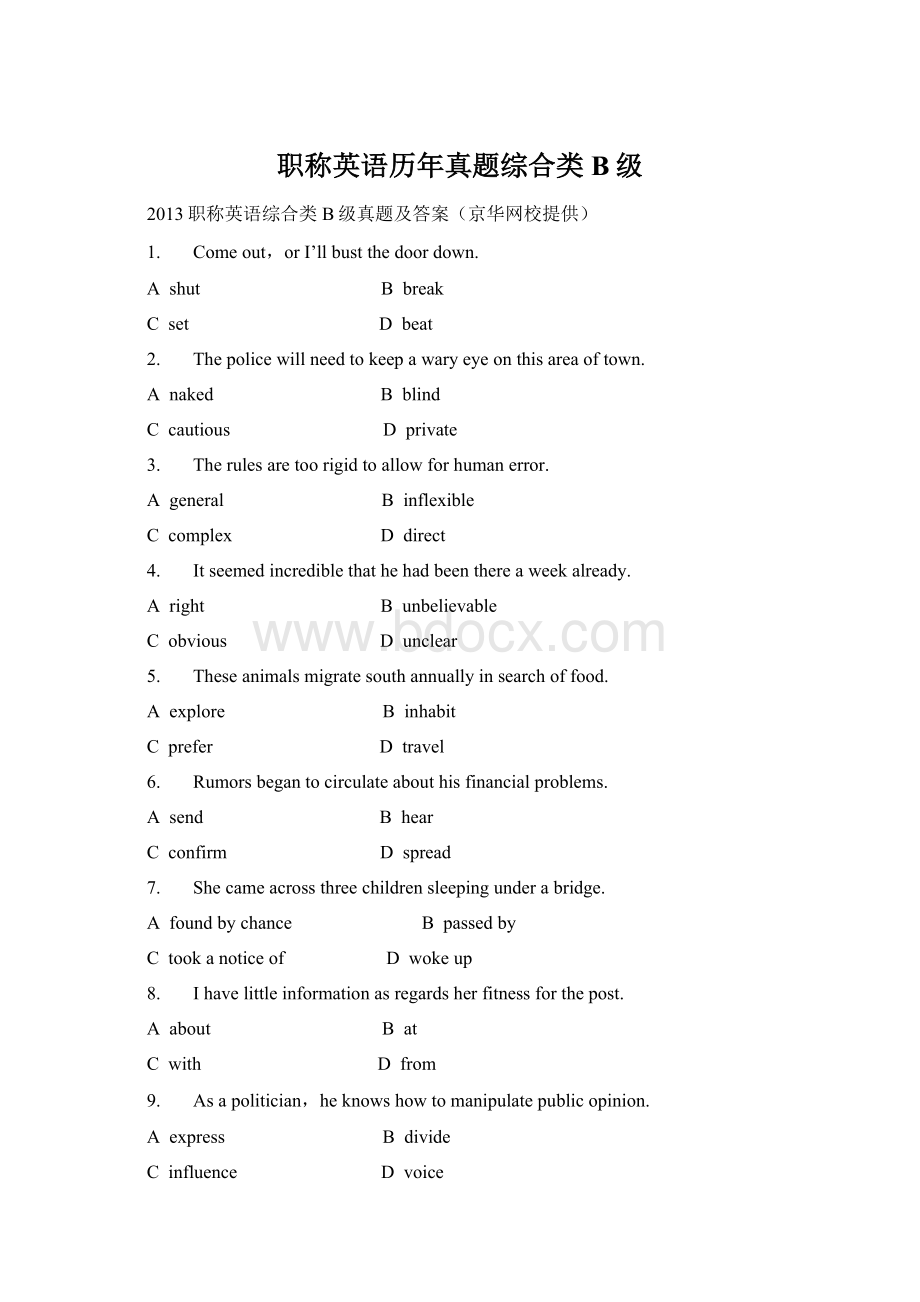职称英语历年真题综合类B级.docx
《职称英语历年真题综合类B级.docx》由会员分享,可在线阅读,更多相关《职称英语历年真题综合类B级.docx(8页珍藏版)》请在冰豆网上搜索。

职称英语历年真题综合类B级
2013职称英语综合类B级真题及答案(京华网校提供)
1. Comeout,orI’ll bust thedoordown.
A shut B break
C set D beat
2. Thepolicewillneedtokeepa wary eyeonthisareaoftown.
A naked B blind
C cautious D private
3. Therulesaretoo rigid toallowforhumanerror.
A general B inflexible
C complex D direct
4. Itseemed incredible thathehadbeenthereaweekalready.
A right B unbelievable
C obvious D unclear
5. Theseanimals migrate southannuallyinsearchoffood.
A explore B inhabit
C prefer D travel
6. Rumorsbeganto circulate abouthisfinancialproblems.
A send B hear
C confirm D spread
7. She cameacross threechildrensleepingunderabridge.
A foundbychance B passedby
C tookanoticeof D wokeup
8. Ihavelittleinformation asregards herfitnessforthepost.
A about B at
C with D from
9. Asapolitician,heknowshowto manipulate publicopinion.
A express B divide
C influence D voice
10. Hewas tempted bythehighsalaryofferedbythecompany.
A taught B kept
C changed D attracted
11. Hepaused,waitingforherto digest theinformation.
A withhold B exchange
C understand D contact
12. Makesurethetableissecurely anchored.
A repaired B cleared
C booked D fixed
13. Shegets aggressive whensheisdrunk.
A offensive B worried
C sleepy D anxious
14. Therewassomething peculiar inthewayhesmiles.
A different B strange
C wrong D funny
15. Thecontractbetweenthetwocompanieswill expire soon.
A shorten B end
C start D resume
第二部分阅读判断
kickingthehabit
whatisabadhabit?
themostdefinitionisthatitissomethingthatwedoregularly,almostwithoutthinkingaboutit,andwhichhassomesortofnegativeconsequence.thisconsequencecouldaffectthosearoundus,oritcouldaffectuspersonally.thosewhodenyhavingbadhabitsareprobablylying.badhabitarepartofwhatmakesushuman.
manyearlyhabits,likesuckingoutthumb,arebrokenwhenweareveryyoung.weareeithertoldtostopdoingitbyourparents,orweconsciouslyorsubconsciouslyobservethatothersdonothavethesamehabit,andwegraduallygrowoutofit.itiswhenweintentionallyorunintentionallypickupnewhabitsinourlaterchildhoodorearlyadulthoodthatitbecomesaproblem.unlesswecanbreakthathabitearlyon,itbecomesapartofoutlife,andbecomes“programmed”intoourbrain.
arecentstudyofhumanmemorysuggeststhatnomatterhowhardwetrytochangeouthabits,itistheoldwaysthattendtowin,especiallyinsituationswherewearerushed,stressedoroverworked.habitsthatwethoughtwehadgotridofcansuddenlycomeback.duringthestudyprogram,theresearchersshowedagroupofvolunteersseveralpictures,andgavethemwordstoassociatewiththem.theythenshowedthevolunteersthesamepictureagain,andgavethemnewwordstoassociatewiththem,
afewdayslater,thevolunteersweregivenatest.theresearchersshowedthemthepictures,andtoldthemtorespondwithoneofthewordstheyhadbeengivenforeachone.itcameasnosurprisethattheiranswersweresplitbetweenthefirstsetofwordsandsecond.twoweekslater,theyweregiventhesametestagain.thistime,mostofthemonlygavethefirstsetofwords.theyappearedtohavecompletelyforgottenthesecondset.
thestudyconfirmsthattheresponseswelearnfirstarethosethatremainstrongestovertime.wemaytrytochangeoutways,butafterawhile,theresponsethatcomestomindfirstisusuallythefirstonewelearned.themorethatresponseisused,themoreautomaticitbecomesandtheharderitbecomestorespondinanyotherway.
thestudythereforesuggeststhatovertime,ourbadhabitsalsobecomeautomatic,learnedbehavior.thisisnotgoodnewsforpeoplewhopickupbadhabitsearlyinlifeandnowwanttochangeorbreakthem.evenwhenwetrytoputnew,goodintentionsintopractice,thosepreviouslearnedhabitsremainstrongerinmoreautomatic,unconsciousformsofmemory.
16.boysusuallydevelopbadhabitswhentheyareveryyoung.
a.rightb.wrongc.notmentioned
17.wecanonlybreakbadhabitsifotherstellustodo.
a.rightb.wrongc.notmentioned
18.badhabitsmayreturnwhenweareunderpressure.
a.rightb.wrongc.notmentioned
19.researchersweresurprisedbytheanswerthatthevolunteersgaveinthefirsttest.
a.rightb.wrongc.notmentioned
20.thevolunteersfoundthetestmoredifficultwhentheydiditthesecondtime.
a.rightb.wrongc.notmentioned
21.thestudysuggeststhatitismoredifficulttorespondwhattogetridof.
a.rightb.wrongc.notmentioned
22.ifwedevelopbadhabitsearlyinlife,theyarehardertogetridof.
a.rightb.wrongc.notmentioned
参考答案:
c、b、a、b、c、b、a
∙第4部分:
阅读理解(第31~45题,每题3分,共45分)下面有3篇短文,每篇短文后有5道题。
请根据短文内容,为每题确定1个最佳选项。
第一篇 onthetrialofthehoneybadger
onarecentfieldtriptothekalaharidesert,ateamofresearcherslearnalotmoreabouthoneybadgers.theteamemployedalocalwildlifeexpertkitsokhamatohelpthemlocateandfollowthebadgersacrossthedesert.theirmainaimwastostudythebadgers’movementsandbehaviorasdiscreetly(谨慎地)aspossiblewithoutfrighteningthemawayorcausingthemtochangetheirnaturalbehavior.theyalsoplannedtotrapafewandstudythemcloseupbeforereleasingtheminviewoftheanimal’sreputation;thiswassomethingthatevenkhamawasreluctanttodo.
“theproblemwithhoneybadgersistheyarenaturallycuriousanimals,especiallywhentheyseesomethingnew,”hesays.“that,combinedwiththeirunpredictablenature,canbeadangerousmixture.iftheysenseyouhavefood,forexample,theywon’tbeshyaboutcomingrightuptoyouforsomethingtoeat.they’reactuallyquitesociablecreaturesaroundhumans,butassoonastheyfeeltheymightbeindanger,theycanbecomeextremelyvicious(凶恶的).fortunatelythisisrare,butitdoeshappen.”
theresearchconfirmedmanythingsthatwerealreadyknown.asexpected,honeybadgersateanycreaturestheycouldcatchandkill.evenpoisonoussnakes,fearedandavoidedbymostotheranimals,werenotsafefromthem.theresearchersweresurprised,however,bytheanimal’sfondnessforlocalmelons,probablybecauseoftheirhighwatercontent.preciouslyresearchersthoughtthattheanimalgotallofitsliquidrequirementsfromitsprey(猎物).theteamalsolearntthat,contrarytopreviousresearchfindings,thebadgersoccasionallyformedloosefamilygroups.theywerealsoabletoconfirmcertainresultsfrompreviousresearch,includingthefactthatfemalebadgersneversocializedwitheachother.
followingsomeofthemalebadgerswasachallenge,sincetheycancoverlargedistancesinashortspaceoftime.somehuntingterritoriescovermorethan500squarekilometers.althoughtheyseemhappytosharetheseterritorieswithothermales,theyareoccasionalfightsoveranimportantfoodsource,andmalebadgerscanbeasaggressivetowardseachotherastheyaretowardsotherspecies.
asthebadgersbecameaccustomedtothepresenceofpeople,itgavetheteamthetogetupclosetothemwithoutbeingthesubjectoftheanimal’scuriosity—orsuddenaggression.thebadgers’eatingpatternswhichhadbeendisruptedtonormal.italsoallowedtheteamtoobservemorecloselysomeoftheothercreaturesthatformworkingassociationswiththehoneybadger,astheseseemedtobadgers’relaxedattitudewhennearhumans.
31.whydidthewildlifeexpertsvisitthekalaharidesert?
a.tofindwherehoneybadgerslive.
b.tocatchsomehoneybadgersforfood.
c.toobservehowhoneybadgersbehave.
d.tofindoutwhyhoneybadgershaveabadreputation.
32.whatdoeskitsokhamasayabouthoneybadgers?
a.theyarealwayslookingforfood.
b.theydonotenjoyhumancompany.
c.theyshowinterestinthingstheyarenotfamiliarwith.
d.itiscommonforthemtoattackpeople.
33.whatdidtheteamfindoutabouthoneybadgers?
a.thereweresomecreaturestheydidnoteat.
b.theywereafraidofpoisonouscreatures.
c.femalebadgersdidnotmixwithmalebadgers.
d.theymaygetsomeofthewatertheyneededfromfruit.
34.whichofthefollowingisatypicalfeatureofmalebadgers?
a.theydon’trunveryquickly.
b.theydefendtheirterritoryfromotherbadgers.
c.theyhuntoveraverylargearea.
d.theyaremoreaggressivethanfemales.
35.whathappenedwhenhoneybadgersgotusedtohumansaroundthem?
a.theybecamelessaggressivetowardsothercreatures.
b.theylostinterestinpeople.
c.theystartedeatingmore.
d.otheranimalsstartedworkingwiththem.
第二篇
"lucky